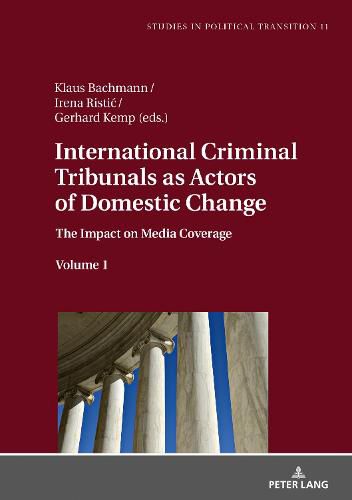Readings Newsletter
Become a Readings Member to make your shopping experience even easier.
Sign in or sign up for free!
You’re not far away from qualifying for FREE standard shipping within Australia
You’ve qualified for FREE standard shipping within Australia
The cart is loading…






This title is printed to order. This book may have been self-published. If so, we cannot guarantee the quality of the content. In the main most books will have gone through the editing process however some may not. We therefore suggest that you be aware of this before ordering this book. If in doubt check either the author or publisher’s details as we are unable to accept any returns unless they are faulty. Please contact us if you have any questions.
Do International Criminal Tribunals trigger social change, provide reconciliation, stabilize fragile post-conflict societies? Many authors claim they do, but they base their assumptions mainly on theoretical considerations and opinion polls. The editors and authors of this book take a different position: based on extensive field research in nine European and African countries, they examine whether tribunal decisions resulted in changes in media frames about the conflicts which gave rise to the creation of these tribunals. International Tribunals hardly ever shape or change the grand narratives about wars and other conflicts, but they often manage to trigger small changes in media frames which, in some cases, even lead to public reflexion about guilt and responsibility and more awareness for (the respective enemy’s) victims. On an empirical basis, this book shows the potential of International Criminal Justice, the possibilities, but also the limits of International Criminal Tribunals. Volume 1 presents the evidence from Bosnia-Herzegovina, Montenegro, Kosovo, Serbia and Croatia.
$9.00 standard shipping within Australia
FREE standard shipping within Australia for orders over $100.00
Express & International shipping calculated at checkout
This title is printed to order. This book may have been self-published. If so, we cannot guarantee the quality of the content. In the main most books will have gone through the editing process however some may not. We therefore suggest that you be aware of this before ordering this book. If in doubt check either the author or publisher’s details as we are unable to accept any returns unless they are faulty. Please contact us if you have any questions.
Do International Criminal Tribunals trigger social change, provide reconciliation, stabilize fragile post-conflict societies? Many authors claim they do, but they base their assumptions mainly on theoretical considerations and opinion polls. The editors and authors of this book take a different position: based on extensive field research in nine European and African countries, they examine whether tribunal decisions resulted in changes in media frames about the conflicts which gave rise to the creation of these tribunals. International Tribunals hardly ever shape or change the grand narratives about wars and other conflicts, but they often manage to trigger small changes in media frames which, in some cases, even lead to public reflexion about guilt and responsibility and more awareness for (the respective enemy’s) victims. On an empirical basis, this book shows the potential of International Criminal Justice, the possibilities, but also the limits of International Criminal Tribunals. Volume 1 presents the evidence from Bosnia-Herzegovina, Montenegro, Kosovo, Serbia and Croatia.